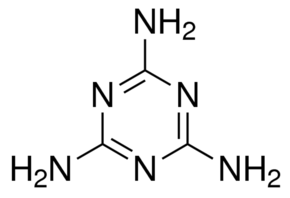Melamine

Product Description
Melamine is a organic compound that has many industrial uses such the manufacturing of some cooking utensils, plates, plastic products, paper, paperboard, and industrial coatings, among other things.
Product:
Melamine
CAS:
108-78-1
Synonym:
1,3,5-Triazine-2,4,6-triamine; Cyanuramide; Cyanurotriamide
Structure:

Typical Characteristics
Appearance
White Solid
Density
1.573 g/cm3
Melting point
354 °C
Molecular Weight
126.12
Purity
99 %
Refractive index
1.872
Uses, Applications & Markets
Key applications
get a quote



Melamine used in many
industry applications
Melamine is a chemical compound with various industrial and commercial applications. Here's a list of some of its uses:
- Plastics Production: Melamine is a key component in the production of melamine-formaldehyde resins, which are widely used in the manufacture of laminates, coatings, adhesives, molding compounds, and thermosetting plastics. These materials are valued for their high heat resistance, mechanical strength, and chemical stability, making them suitable for applications in construction, automotive, and consumer goods industries.
- Construction Materials: Melamine-based laminates and panels are used in construction applications, such as kitchen countertops, cabinets, flooring, and wall panels. They provide durable and hygienic surfaces that are resistant to scratches, stains, and moisture, making them ideal for residential and commercial installations.
- Food Industry: Melamine resin tableware, such as plates, bowls, and utensils, is commonly used in the food service industry due to its durability, break resistance, and affordability. However, it is important to note that melamine tableware should not be used to serve hot foods or acidic foods, as melamine can leach into the food under certain conditions.
- Textile Industry: Melamine-based formaldehyde resins are used as textile finishing agents to impart wrinkle resistance, crease recovery, and shrinkage control to fabrics and garments. These resins are applied to cotton, polyester, and blended textiles through padding, spraying, or foam application methods.
- Fire Retardants: Melamine compounds are used as flame retardants in various materials, including textiles, plastics, foams, and coatings. Melamine-based flame retardants release nitrogen gas when exposed to fire, which dilutes the oxygen concentration and suppresses the combustion process, thereby reducing the flammability and smoke emission of the treated materials.
- Adhesives and Binders: Melamine-formaldehyde resins are widely used as adhesives and binders in wood-based panels, such as particleboard, medium-density fiberboard (MDF), and plywood. These resins provide strong bonding strength, water resistance, and dimensional stability to engineered wood products used in furniture, cabinetry, and construction.
- Paper Coatings: Melamine-formaldehyde resins are used as coatings and surface treatments for paper and paperboard products to improve printability, gloss, and moisture resistance. These coatings enhance the quality and durability of packaging materials, decorative papers, and coated papers used in printing and publishing applications.
- Membrane Filtration: Melamine membranes are used in membrane filtration processes for separating and purifying liquids and gases. Melamine membranes exhibit high permeability, chemical resistance, and thermal stability, making them suitable for applications in water treatment, wastewater purification, and gas separation.
- Personal Care Products: Melamine formaldehyde resins are used in personal care products, such as hair straightening treatments and nail polish, as film-forming agents and binding agents. These resins help improve the adhesion, durability, and gloss of cosmetic formulations without causing skin irritation or sensitization.
- Industrial Coatings: Melamine-based coatings and paints are used in industrial applications, such as automotive finishes, appliance coatings, and metal coatings. These coatings provide excellent hardness, scratch resistance, and chemical resistance, making them suitable for demanding environments and outdoor exposure.